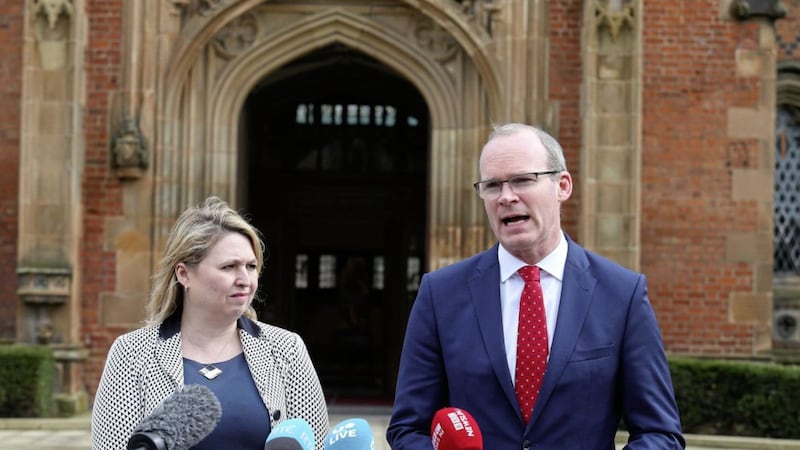Tánaiste Simon Coveney has said the Good Friday Agreement "changed history" and relations between Ireland and Britain.
The Foreign Affairs Minister told yesterday's event to mark the accord's 20th anniversary that Northern Ireland was a "changed place".
"I think this week it is important to focus on the positives but also I think it is important that we would renew as well as remember in the context of the spirit of the Good Friday Agreement in terms of what remains to be done, this is an agreement that provides the basis for so much if we choose to implement it in full," he said.
The Fine Gael deputy leader urged current political leaders to "reinvigorate" efforts to find a solution to the Stormont impasse.
"To find a way forward through the challenges that our generation now has, whether that is linked to Brexit, to devolved government, whether it is linked to polarisation and challenges around reconciliation and legacy," he said.
At the same event, Secretary of State Karen Bradley described Good Friday 1998 as a "momentous day" and said progress must not be allowed to slip.
"You cannot underestimate what has been achieved in Northern Ireland since that agreement was signed," she said.
"Both the UK and Irish governments remain committed to the Good Friday Agreement, its institutions, its structures, its framework – we will work together tirelessly to restore that devolved government that we all know is so vital to the success of Northern Ireland."
Former Sinn Féin president Gerry Adams voiced confidence that the north's future was "bright" despite the current political impasse.
"The institutions will be back in place," he said.
"The Good Friday Agreement remains the accord which is going to guide politics on this island and arrangements on this island and relationships on this island into the foreseeable future."
He said there was "always an ebb and a flow" and currently the process was in the former and it was "temporary."
Former taoiseach Bertie Ahern said the agreement would be a connection between the British and Irish governments post-Brexit.
"I think the Good Friday Agreement will now form the impetus for the British and Irish governments to meet – I would suggest every quarter – to build and continue relationships that Brexit has ruined and damaged."
He said it was important for ministers and civil servants to "collaborate" on "major issues".
"The Good Friday Agreement, although we didn't intend it at the time, I think that now can replace that relationship," the one-time Fianna Fáil leader said.
"As far as Brexit is concerned and hard border, soft border, sunny side up border, every kind of border – there can be no border. It will not be acceptable in any event."
Former British prime minister Tony Blair described Brexit as a "profound mistake" and warned of challenging consequences.
"Let me make it clear, we are going to overcome that challenge and we should overcome it because preserving this agreement is really, really important," he said.
"But those people who are either disdainful of the challenge or dismissive, this is going to require real focus and hard work because we cannot return to a hard border between north and south, it would be a disaster for the agreement and for the relationship between the Republic and the UK, and therefore for the people of Northern Ireland."








